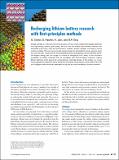Recharging lithium battery research with first-principles methods
Author(s)
Ceder, Gerbrand; Hautier, Geoffroy; Jain, Anubhav; Ong, Shyue Ping
DownloadCeder_Recharging lithium.pdf (609.5Kb)
PUBLISHER_POLICY
Publisher Policy
Article is made available in accordance with the publisher's policy and may be subject to US copyright law. Please refer to the publisher's site for terms of use.
Terms of use
Metadata
Show full item recordAbstract
Energy storage is a critical hurdle to the success of many clean energy technologies. Batteries with high energy density, good safety, and low cost can enable more efficient vehicles with electrified drive trains, such as hybrid electric vehicles, electric vehicles, and plug-in hybrid electric vehicles. They can also provide energy storage for intermittent energy sources, such
as wind and solar. Today, and for the foreseeable future, rechargeable lithium batteries deliver the highest energy per unit weight or volume at reasonable cost. Many of the important properties of battery materials can be calculated with fi rst-principles methods, making lithium batteries fertile ground for computational materials design. In this article, we review the successes and opportunities in using fi rst-principles computations in the battery fi eld. We also highlight some technical challenges facing the accurate modeling of battery materials.
Date issued
2012-02Department
Massachusetts Institute of Technology. Department of Electrical Engineering and Computer Science; Massachusetts Institute of Technology. Department of Materials Science and EngineeringJournal
MRS Bulletin
Publisher
Cambridge University Press (Materials Research Society)
Citation
Ceder, G. et al. "Recharging lithium battery research with first-principles methods." MRS Bulletin 37, no. 02 (February 17, 2012): b1-b2.
Version: Final published version
ISSN
0883-7694
1938-1425